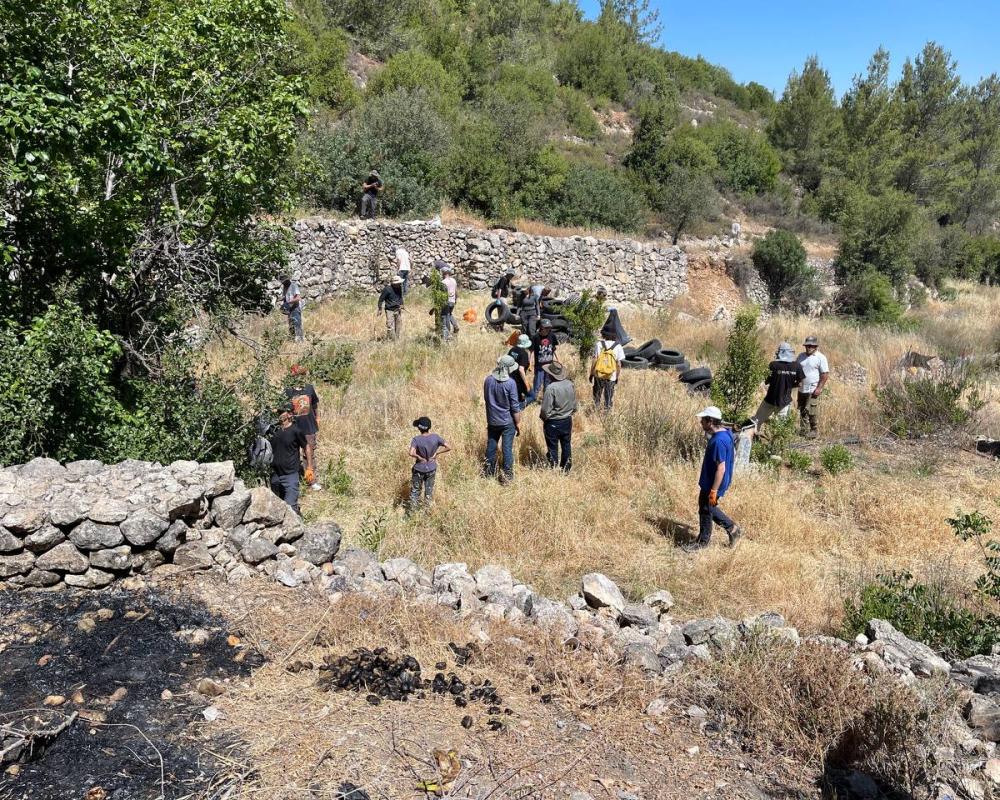
Bethlehem/ PNN/
In the hills surrounding the UNESCO World Heritage village of Battir and the Wadi al-Makhrour area in the occupied West Bank, a new wave of international solidarity is taking root. Foreign volunteers are working alongside Palestinian farmers to rehabilitate lands, rebuild terraces, and provide a protective presence in response to intensifying settler attacks.
The campaign, launched by the Bethlehem-based Holy Land Trust under the banner “All Eyes on al-Makhrour and Battir,” aims to support landowners who say they are increasingly targeted by Israeli settlers acting with impunity under the protection—or passive watch—of Israeli forces.
In recent weeks, dozens of international activists have joined efforts to clean farmland, restore water canals, and replant areas in the Ein Amdan region of Battir. The land belongs to the al-Shami family, which reported that settlers had uprooted trees, demolished terraces, and chased them off the property.
“We’re seeing an alarming increase in settler violence, especially since the start of the war in Gaza,” said Elias D’eis, director of Holy Land Trust. “This campaign is about more than planting trees. It’s about protecting farmers, keeping the land cultivated, and making sure the international community sees what’s happening here.”
D’eis said the effort is conducted in partnership with several international organizations and includes weekly volunteer missions. These not only provide agricultural assistance but also serve as a form of protective accompaniment, which many farmers say is the only way they can safely return to their land.
Farmers Speak of Escalating Attacks
Samir al-Shami, a farmer from Battir, said settlers have prevented his family from accessing their land since October 7. “They destroyed hundreds of fruit trees, broke stone walls, and damaged the water springs we rely on for irrigation,” he said. “They even threatened us with guns.”
According to al-Shami, the presence of foreign volunteers has enabled the family to return to their fields without immediate threats. Some of the same activists, he added, also helped the family during the recent olive harvest, deterring settlers from interfering.
A Heritage Site at Risk
Battir, known for its ancient Roman-era irrigation system and terraced hills, was added to the UNESCO World Heritage list in 2014. But residents say the recognition has not shielded them from land seizure or settler encroachment.
Ghassan Alayan, head of Battir’s Land Defense Committee and a researcher involved in its UNESCO dossier, said the village has been subject to systematic land grabs since 2017. While settler activity previously stalled due to local and international resistance—including legal battles—it has sharply intensified over the past year.
“In December 2024, settlers began placing caravans and livestock enclosures in key areas of farmland, with direct support from Israeli military and police forces,” Alayan said. “They’ve laid foundations, lit roads, and restricted Palestinian access to large swathes of agricultural land.”
He warned that such moves threaten not only Palestinian ownership but also the integrity of Battir as a World Heritage site. “Settlers are acting like a militia, emboldened by political protection,” he said. “But the people of Battir are not giving up. They have their land deeds, including Ottoman-era titles, and they are determined to fight back—legally and on the ground.”
Alayan emphasized that the international presence is crucial, especially as Israeli settler groups, such as the Hilltop Youth, attempt to create facts on the ground. “This is not just a local issue—it’s a global one. The world needs to decide whether it will stand by and watch a cultural and ecological treasure be destroyed.”